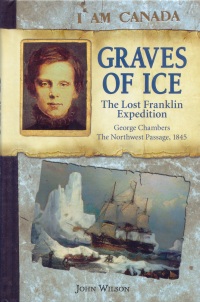| ________________
CM . . .
. Volume XX Number 37. . . .May 23, 2014
excerpt:
The Franklin expedition set off in such a flurry of optimism, of planning for all possible contingencies, with ships reinforced to withstand the pressure of ice floes, food for three years, scientific instruments for measurements and samplings. It should have been a major triumph for British seamanship and daring, but, instead, it all went horribly, horribly wrong. The why of it has occupied many books of fact and fiction. John Wilson's Graves of Ice in the “I Am Canada” series is only the latest in a long list which includes another YA novel by Wilson, namely Across Frozen Seas. Since almost everyone knows that the trip was a tragedy and that none of the men survived, Wilson does well to book-end his novel with two short bits set in the narrator's 'present', which is to say his/the end. The book opens as young George Chambers is burying the last of those who set off from England with such enthusiasm, and ends with his waiting, without much hope, perhaps to be rescued by a stray late-in-the-season whaling vessel. In between, we have the optimistic equipping of the boats, the signing of the crew, and the setting sail from Greenhithe amid cheers and with all flags flying. It continues through misadventure, deaths, mismanagement, deaths, accidents, deaths ... until there is no one left. It's a compelling story, and Wilson tells it well. He presents no answers to the question of why this should have been such a disaster, but he suggests strongly that it was bad luck, bad management, and a strong tendency to put too much faith in the wonders of science and modern inventions such as tinned foods. Earlier and later expeditions both enlisted the help of the Inuit and used their methods of survival, but Franklin's did not. Wilson implies that overconfidence and arrogance played significant roles in the outcome. I suspect he was right on the money! As for the novel itself, the whole story is coloured by the division between officers and crew. George as cabin boy is crew, but his father had saved Franklin's life at the Battle of Trafalgar, and he had been to school, both of which put George into the upper class. Davy, the other cabin boy, is illiterate and had been scrounging a living as a mudlark and assistant resurrection man before joining the crew of the Erebus. The two had shared escapades, more and less dangerous, before finding themselves bunking together on this voyage, and they are friends of a sort though definitely on opposite sides of the class divide. But, in the end, it didn't matter which side you were on. Dead was dead. George is a nice chap, honest, hardworking, and idealistic. Davy is a realist, an opportunist, and one of the many among the crew who enrolled in the endeavour for the extra pay. The clash of ideologies makes for an uneasy relationship between the two which Wilson could have exploited further than he did. The tension is there in the background of all their interactions, but never comes to any resolution. When poor Davy is hovering on the brink of death, haunted by the memory of having eaten bits of his dead shipmates, George cannot keep his horror from showing, and Davy dies uncomforted and condemned by them both. George survives for a short time longer, but without resorting to cannibalism. Which of them was right? This is a haunting story that keeps the reader rivetted even knowing the outcome in advance. The positive results of the voyage were the discoveries made by the many explorers who came after Franklin searching for answers to what had happened to his expedition, and, of course, the books, of which Graves of Ice is one. Recommended. Mary Thomas lives in Winnipeg, MB, where the past winter gave Winnipegers a taste of life in the Arctic!
To comment
on this title or this review, send mail to cm@umanitoba.ca.
Copyright © the Manitoba Library Association. Reproduction for personal
use is permitted only if this copyright notice is maintained. Any
other reproduction is prohibited without permission.
NEXT REVIEW |
TABLE OF CONTENTS FOR THIS ISSUE
- May 23, 2014.
AUTHORS |
TITLES |
MEDIA REVIEWS |
PROFILES |
BACK ISSUES |
SEARCH |
CMARCHIVE |
HOME |
